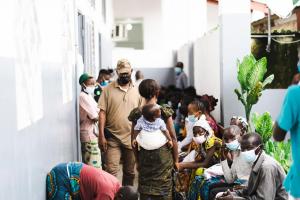What is impeding Africa’s TB fight?
Cape Town – Africa has made progress in the fight against tuberculosis (TB) in recent years, however several hurdles are curbing the efforts to end this preventable and curable disease and at the current pace, the global targets to eliminate the disease by 2030 look increasingly elusive. Dr Norbert Ndjeka, Chief Director of TB Control and Management in South Africa’s National Department of health, assesses the challenges and how to accelerate progress.
Why is progress against tuberculosis slowing down in Africa?
There are several factors, including the fact that TB screening and testing are not been appropriately done. Many countries in Africa still rely on smear microscopy which is less sensitive than the recommended WHO rapid diagnostic test. Limited ability to find people with TB explains the fact that TB transmission continues to increase. Universal access to drug susceptibility tests adds to the challenge. The gap between the estimated number of TB cases and the number of TB cases detected remains very wide. The introduction of new drugs has also been very slow due to numerous reasons, while the African region is also struggling to scale up of TB preventive therapy. Weak health systems, poverty and inadequate nutritional support in many countries also contribute to the high TB burden in the region. TB infection is influenced by social and economic development determinants such as undernutrition, diabetes, HIV infection, alcohol use disorders and smoking which must be addressed through a multisectoral action and accountability to ensure its timely implementation. Despite the toll of the disease, TB is not yet at the forefront of health priorities in many countries. In Africa, governments contribute only 22% of the resources required to deliver adequate tuberculosis services, while 44% of needs remain unfunded. There is an urgent need to intensify efforts to mobilize additional funds from domestic sources and international donors.
How has COVID-19 affected TB response in the continent?
COVID-19 has affected TB case finding and TB linkage to care. In many countries, human, financial and other resources have been reallocated from tackling TB to the COVID-19 response, limiting the availability of essential services. People affected by TB have struggled to seek care in the context of lockdowns. COVID-19 has also impacted the detection of drug-resistant TB, with the number of cases recorded in the AFRO region has decreased by 28% in 2020 compared to 2019.
There are also reports of inadequate patient retention in care, as COVID-19 has exacerbated weaknesses existing before the pandemic. Although there are negative effects, we can apply some of the lessons learned in fighting COVID-19 in TB control. These include the effective collaboration between the public and the private health sectors, the real-time reporting of new cases and effective dissemination of information. The consistent use of personal protective equipment’s (masks and respirators) is also something that we had wanted to do in health care facilities in high TB burden areas. We need to ensure this practice stays in health care settings in high-burden settings. Although to treat is to prevent, but prevention in the first place is better.
What can be done to reach the TB elimination targets?
We need to scale up TB preventive therapy. Improvement of infection control measures at all public and private health care facilities is required to prevent TB. Several people get TB by visiting health care facilities for other health conditions than TB. We need to make our health care facilities safe. We also need to implement our case finding strategies by using rapid molecular diagnostic tests as initial TB diagnostic tests. We must also adopt universal testing and treatment approach. By so doing, the gap between estimated TB numbers and TB detected cases can be reduced and it will be possible to curb TB transmission if patient-centred models of care are put in place. Treatment with new and shorter treatment regimens with higher efficacy and better safety should also be adopted by countries. Establishing strong partnerships with civil society and academia is necessary to enhance TB response. TB programmes in the region need to support operational research while protecting vulnerable people. Finally, we need to note that TB is also a social problem. Poverty reduction and improvement of general living conditions such as housing, employment will go a long way in decreasing TB transmission. A TB vaccine that protects against pulmonary tuberculosis is an imperative. That is why a multisectoral response is needed if we are to beat TB.



